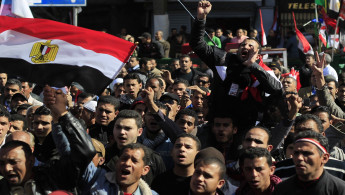Egypt's revolution has a common enemy, but no unity
Will the acquittals of the deposed president Hosni Mubarak, his former interior minister Habib al-Adly and several aides spur revolutionaries to mobilise and reunite?
The court ruling has outraged many groups. But it does not unite them in their beliefs and methods.
Gamal Eid, the head of the Arab Network for Human Rights Information, said his group did not share common beliefs with other anti-coup groups.
"We have to define what we mean by unity, as every political movement has its own goals. Having a common enemy, that is Mubarak and his regime, does not mean we share the same goals.
"The Muslim Brotherhood wants to establish a religious state. Others want a civil state governed by the military behind the scenes. We reject both ideas as we cannot trust the military or the Brotherhood."
Eid said he hoped that armed confrontations did not take place over the acquittals, adding only "legitimate channels" of action, such as demonstrations, and calls for the trial of corrupt officials and those who killed protesters, were acceptable.
Ali Khafagi, a regional treasurer in the Brotherhood-linked Freedom and Justice Party, said he believed it was possible to unite "if other revolutionary forces wanted to cooperate with the Brotherhood youth and organise joint protests".
However, Khafagi said he was not optimistic - as many anti-coup groups did not trust the Brotherhood either.
"The acquittal of Mubarak might push Egyptians to take the law into their own hands against the murderers," Khafagi said. "The youth know who killed the protesters in the January revolution and know who killed 1,500 people in the massacres in Rabaa and al-Nahda.
"They will see that their peaceful protests have had no effect, as all the criminals are now free, while protesters are being imprisoned for 15 years and someone in possession of a pin with a sign of Rabaa is being sentenced to 15 years."
| They will see their peaceful protests have had no effect, as all the criminals are now free. - Ali Khfagi, Freedom and Justice party |
University students
The vice-president of the Egyptian student union, Ahmed al-Baqri, said he did not believe students would engage in armed clashes with the security forces.
However, he said that he thought anger among the youth would increase and large protests, like the "Friday of Anger" on 28 January 2011, which crippled the ability of security forces to respond, would likely be seen again on Cairo's streets.
Baqri also said he believed the acquittals would unify the revolutionaries, and that the verdict came at the right time to unite the various factions after a period of division.
"The revolutionary movement will continue and the youth whose dreams have been stolen will regain those dreams and Egypt will become a modern democracy, governed by social justice for all segments of its society."
This is an edited translation from our Arabic edition.



